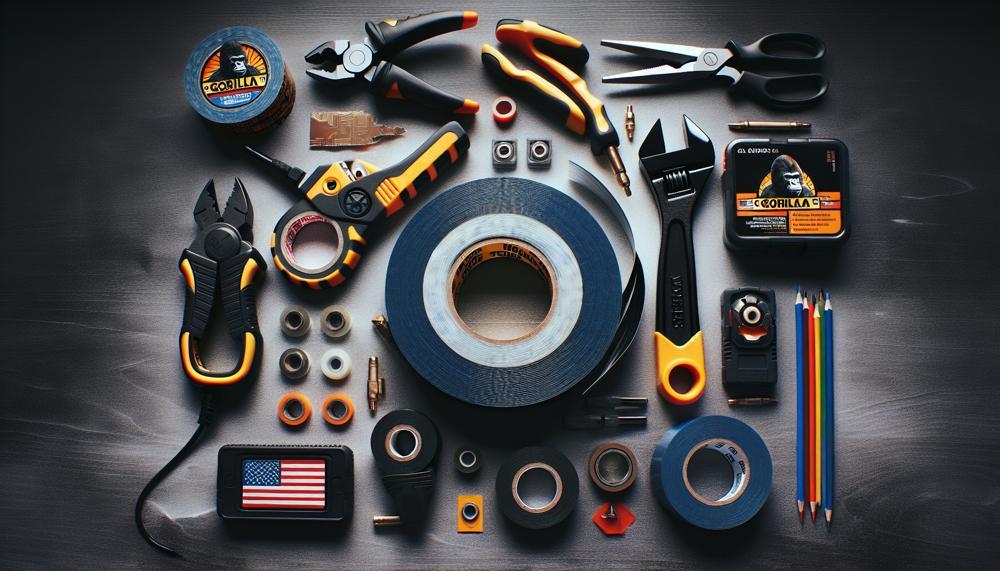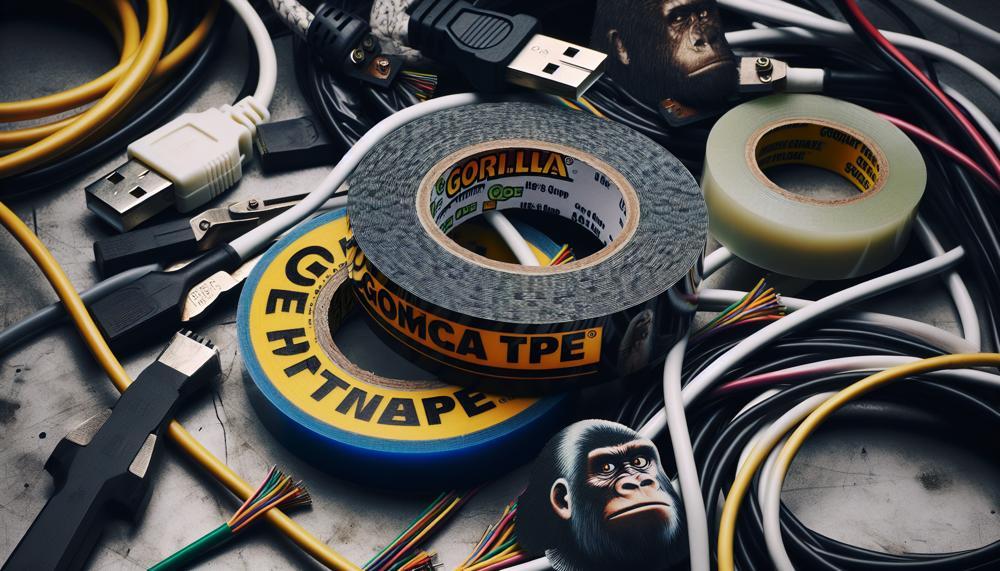Are you tired of constantly replacing your electrical tape because it loses its stickiness? Or are you frustrated with the limited color options and lack of durability of traditional electrical tape? We have a game-changing solution for you: gorilla tape.
Yes, you read that right—gorilla tape as electrical tape. This heavy-duty adhesive has been making waves in the world of home repairs and construction. But did you know it can also be used as a substitute for traditional electrical tape? Here’s why:
- Gorilla tape boasts a strong adhesive that can withstand extreme temperatures and moisture, making it perfect for outdoor or high-moisture areas.
- Unlike regular electrical tape, gorilla tape comes in a variety of colors, allowing for more creative and organized labeling.
- Its durable design means it won’t easily tear or stretch, ensuring a long-lasting hold on your wires.
- With its thick and tough material, gorilla tape provides added protection against abrasions and punctures.
So, next time you reach for that old roll of electrical tape, consider giving gorilla tape a try. Trust us, once you go gorilla, you’ll never go back to traditional tapes again.
Table of Contents
- 1 Can I Use Gorilla Tape as Electrical Tape?
- 2 The Benefits of Using Gorilla Tape as Electrical Tape
- 3 The Risks of Using Gorilla Tape as Electrical Tape
- 4 How to Identify If Gorilla Tape Is Safe For Electrical Use
- 5 The Different Types of Electrical Tape and When to Use Them
- 6 What to Do If You’ve Used Gorilla Tape as Electrical Tape
- 7 Pros and Cons of Using Gorilla Tape as Electrical Tape
- 8 Alternatives to Using Gorilla Tape as Electrical Tape
- 9 What Electrical Applications Are Best Suited for Gorilla Tape
- 10 Understanding the Differences Between Gorilla Tape and Electrical Tape
- 11 Tips for Safely Using Gorilla Tape as Electrical Tape
- 12 Conclusion
Can I Use Gorilla Tape as Electrical Tape?
No, it is not advisable to use Gorilla tape in place of electrical tape.
Although Gorilla tape does possess strong insulating properties and can be utilized for certain electrical tasks, it is not specifically designed for electrical work and does not conduct electricity as effectively as traditional electrical tape.
It also lacks the necessary fireproof and waterproof characteristics to ensure safety when handling electrical systems.
Furthermore, using Gorilla tape can potentially cause hazards and damage to the electrical system due to its inability to withstand extreme temperatures and moisture.
The Benefits of Using Gorilla Tape as Electrical Tape
There are various benefits to using Gorilla Tape as an alternative to traditional electrical tape in specific situations.
While it may not be suitable for all electrical systems, it offers unique advantages that make it a valuable tool for repairs and projects.
| The Benefits of Using Gorilla Tape as Electrical Tape | Description |
| Water and weather resistance | Gorilla Tape is designed to withstand harsh outdoor conditions, making it ideal for repairs and projects in wet or humid environments. Its strong adhesive power ensures that it stays in place, even under heavy stress or strain. |
| Strong adhesive power | The rubber-based adhesive used in Gorilla Tape provides superior sticking power compared to standard electrical tape, ensuring that it stays in place even under heavy stress or strain. |
| Gap-filling properties | The thickness of the adhesive in Gorilla Tape allows it to fill gaps and adhere to rough surfaces, such as wood, stucco, and metal. This makes it useful for repairing holes or tears, as well as holding items together. |
| Versatility | Gorilla Tape can be used for various purposes both indoors and outdoors, making it a versatile tool to have on hand for household repairs and DIY projects. It is suitable for use on a variety of surfaces, including wood, metal, and plastic. |
| Cost-effective | While Gorilla Tape may be more expensive than traditional electrical tape, its durability and strength make it a cost-effective choice in the long run as it does not need to be replaced as often. This is especially beneficial for larger projects that require multiple uses of tape. |
Furthermore, the unique properties of Gorilla Tape make it a valuable tool for specific situations. For example, its water and weather resistance make it ideal for outdoor repairs, such as fixing a torn tarp or securing a loose gutter. Its gap-filling abilities also come in handy when repairing holes in walls or holding together broken objects.
However, it is important to note that Gorilla Tape should not be used as a substitute for electrical tape when dealing with electrical systems.
Each type of tape has its own specific uses and limitations, and using the wrong tape could lead to safety hazards and ineffective repairs.
The Risks of Using Gorilla Tape as Electrical Tape
Using Gorilla Tape as a replacement for electrical tape can have a number of potential hazards, including decreased protection against electrical dangers and potential risks of fire. Gorilla Tape is not specifically designed to insulate against electrical current, making it less effective in shielding against electrical shocks or short circuits.
Its strong adhesive properties and ability to fill gaps may also cause issues when used on electrical wires, as it can be challenging to remove and may interfere with the conductivity of the wires.
Additionally, the rubber-based adhesive of Gorilla Tape can become flammable when exposed to high temperatures, increasing the likelihood of fire hazards in electrical systems.
Therefore, it is not advised to use Gorilla Tape as an alternative to electrical tape in any electrical applications.
While Gorilla Tape may seem like a suitable substitute for electrical tape due to its strong hold and durable nature, it lacks the necessary features to provide adequate protection against electrical hazards.
It’s essential to use proper insulation materials that are specifically designed for electrical use, rather than taking the risk of using a potentially dangerous substitute.
Furthermore, using Gorilla Tape as an alternative to electrical tape can have significant consequences if not used correctly. For instance, improper application or removal of the tape can result in exposed wires and an increased risk of electrical shock or fire.
This is why it’s crucial to follow proper safety protocols and use the correct materials when working with electricity.
How to Identify If Gorilla Tape Is Safe For Electrical Use
When determining if Gorilla Tape is suitable for electrical use, there are several critical factors to consider. These include the tape’s material and composition, adhesive strength, and intended use.
Material and Composition:
Gorilla Tape is constructed from a fabric-like material and features a rubber-based adhesive, making it durable and strong. However, this material is not specifically designed for electrical applications and may not provide sufficient insulation and protection.
Adhesive Strength:
Compared to standard electrical tape, the rubber-based adhesive used in Gorilla Tape offers superior sticking power. While this may make it suitable for certain applications, it’s essential to note that the adhesive is not explicitly designed for electrical work and may not offer adequate protection against electrical hazards.
Intended Use:
Although Gorilla Tape can be used for specific electrical applications, it is primarily marketed as heavy-duty duct tape for general repairs and outdoor projects. It should not be used as a substitute for proper electrical tape.
When working with electrical wires and cables, always use the appropriate tools and equipment to ensure safety.
The Different Types of Electrical Tape and When to Use Them
The Different Types Of Electrical Tape
When it comes to electrical tape, you have four main options to choose from: rubber, vinyl, mastic, and varnish cambric. Each type has its own unique properties, making them suitable for specific purposes. For instance, rubber tape works well in humid environments, while vinyl tape is commonly used for insulation and protection against moisture.
Mastic tape is ideal for outdoor use due to its resistance to moisture and UV rays, and varnish cambric tape offers excellent mechanical protection. Moreover, the different colors of electrical tape indicate various features, such as voltage protection and insulation.
When selecting an electrical tape, it’s crucial to consider factors like backing construction, thickness, and dielectric strength.
Additionally, it’s essential to familiarize yourself with building codes to ensure the tape you choose complies with safety standards.
When to Use Them Correctly
Although Gorilla tape may seem like a strong option for electrical work due to its versatility, it is not recommended.
Despite its durability and ability to withstand harsh weather conditions, moisture, and chemicals, Gorilla tape does not conduct electricity as well as traditional electrical tape. This is because Gorilla tape is made of cloth and rubber-based adhesive.
On the other hand, electrical tape is stronger, thicker, and more durable than Gorilla tape. By using high-quality electrical tape correctly, you can prevent potential hazards caused by loose or damaged wiring.
It’s crucial to note that using the right type of electrical tape is essential for safety and efficiency in any electrical project. However, with so many options available on the market today, choosing the right one can be overwhelming.
That’s why it’s vital to understand the different types of electrical tape and their uses. This knowledge will help you make an informed decision when selecting the most suitable electrical tape for your specific needs.
What to Do If You’ve Used Gorilla Tape as Electrical Tape
If you have ever used Gorilla Tape as electrical tape, you may be putting yourself at risk for potential dangers and hazards. Unlike designated electrical tape, Gorilla Tape does not have flame-retardant properties.
Additionally, it is difficult to handle in tight spaces and curves, and can be more costly for larger projects. Furthermore, it may not provide the same level of insulation and protection against moisture and other elements as traditional electrical tape.
To address these concerns, it is highly recommended to use designated electrical tape for all electrical purposes. Not only does it provide necessary flame-retardant properties, but it is also more flexible and easier to maneuver in tight spaces and curves.
Investing in proper electrical tape for larger projects can save you money in the long run and ensure safety and effectiveness.
Ultimately, while Gorilla Tape may seem like a quick fix for electrical repairs, it is not a suitable substitute for designated electrical tape.
To avoid potential risks and dangers, always opt for the proper tape designed specifically for electrical purposes.
Pros and Cons of Using Gorilla Tape as Electrical Tape
When it comes to using Gorilla Tape instead of traditional electrical tape, there are both advantages and disadvantages to consider. One of the main benefits of Gorilla Tape is its strong adhesive and gap-filling properties, making it ideal for heavy-duty repairs and outdoor projects.
Its ability to withstand water and weather also makes it a versatile choice for both indoor and outdoor use. Additionally, it can adhere to a variety of surfaces, including wood, stucco, and metal, making it a reliable option for various types of repairs.
However, one significant drawback of using Gorilla Tape as electrical tape is its cost. Compared to standard electrical tape, Gorilla Tape can be quite expensive, which may deter those on a budget.
Furthermore, Gorilla Tape is not specifically designed for insulation against electrical currents, meaning it may not provide the same level of protection as traditional electrical tape, which is specially designed for this purpose.

| Advantages | Disadvantages |
|---|---|
| – The strong adhesive and gap-filling properties make it suitable for heavy-duty repairs and outdoor projects. | – The cost is higher than standard electrical tape. |
| – It is water and weather-resistant, making it versatile for both indoor and outdoor use. | – It is not specifically designed for insulation against electrical currents. |
| – It can stick to various surfaces, including wood, stucco, and metal. | – It may not provide the same level of protection against electrical hazards as traditional electrical tape. |
| – It is durable and long-lasting. | |
| – It is suitable for a wide range of purposes beyond just electrical work, such as patching and holding things together. |
Alternatives to Using Gorilla Tape as Electrical Tape
When it comes to insulating wires and protecting against electrical hazards, it is not recommended to use Gorilla Tape as a substitute for electrical tape, despite its versatility and strength. To ensure safety and effectiveness, here are some alternatives to consider:
- Specialized Insulation Tapes: These tapes are specifically designed for electrical purposes and have the necessary insulating properties to protect against electrical currents. They can also withstand extreme temperatures, making them a safe and effective alternative.
- Silicone Rescue Tape: Made of silicone, this tape has self-fusing properties that make it a strong and reliable option for electrical repairs. It can withstand high temperatures and is water-resistant, providing long-lasting protection.
- Professional Electrician: For complex or delicate electrical repairs, it is best to hire a professional electrician. They have the expertise and knowledge to use the appropriate materials and techniques, ensuring safety and effectiveness in their work.
| Product | Features | Price Range |
| Specialized Insulation Tapes | – Specifically designed for electrical purposes – Has insulating properties – Can withstand extreme temperatures |
$5-$20 |
| Silicone Rescue Tape | – Made of silicone – Self-fusing properties – Can withstand high temperatures – Water-resistant |
$7-$15 |
| Professional Electrician | – Expertise and knowledge in electrical repairs – Uses appropriate materials and techniques – Ensures safety and effectiveness in work |
$50-$100 per hour (may vary) |
When considering alternatives to using Gorilla Tape as electrical tape, it is important to prioritize safety and effectiveness. While Gorilla Tape may seem like a convenient option, using the proper materials and techniques is crucial when dealing with electrical repairs.
Whether it’s using specialized insulation tapes or hiring a professional electrician, choosing the right alternative can save you from potential hazards and ensure the longevity of your repair work.
What Electrical Applications Are Best Suited for Gorilla Tape
Gorilla Tape shines as the most effective and dependable option for electrical applications. Its unmatched strength and durability make it the go-to choice for a variety of scenarios, including:
- Repairing damaged wires or cables in outdoor settings where they must endure harsh weather conditions. This could involve fixing wires or cables in a garden or outdoor lighting system where the tape is exposed to rain, sunlight, and extreme temperatures.
- Securing wires or cables to rough surfaces like wood or metal. Thanks to its strong adhesive, Gorilla Tape is perfect for attaching wires or cables to surfaces that may not be smooth, such as wooden beams or metal pipes.
- Patching up gaps or holes in electrical equipment or appliances. With its sturdiness and water resistance, Gorilla Tape is suitable for repairing small holes or tears in electrical equipment like extension cords, power tools, or appliances.
- Insulating wires in areas with high temperatures or moisture levels. Gorilla Tape can withstand temperatures up to 200°F (93°C) and is resistant to moisture, making it a dependable option for insulating wires near heating systems, outdoor lighting fixtures, or humid environments.

| Electrical Application | Gorilla Tape Usage | Reasoning |
| Repairing damaged wires or cables in an outdoor setting | Wrapping around damaged areas to secure and protect wire or cable | Water- and weather-resistant, can withstand harsh outdoor conditions |
| Securing wires or cables to rough surfaces | Attaching wire/cable to a surface using strong adhesive | Durable and can adhere to rough surfaces |
| Patching up gaps or holes in electrical equipment/appliances | Covering hole/tear with tape | Water-resistant and durable, can withstand use on electrical equipment |
| Insulating wires in high temperature/moisture areas | Wrapping around wire to insulate | Can withstand high temperatures and is moisture-resistant |
In conclusion, Gorilla Tape is a versatile and reliable option for various electrical applications that require superior durability, water resistance, and a strong adhesive. However, it should not be used as a replacement for electrical tape when dealing with potential hazards.
Understanding the Differences Between Gorilla Tape and Electrical Tape
It is crucial to have a solid understanding of the differences between Gorilla Tape and Electrical Tape in order to ensure the safety and effectiveness of any repair or project. These two types of tape have unique characteristics that make them suitable for specific tasks, and using the wrong type of tape can result in potential hazards and compromised results.
Gorilla Tape is a heavy-duty tape made from a cloth-like material, while Electrical Tape is typically made from vinyl or rubber. This difference in material affects their adhesive properties, as Gorilla Tape has a thicker layer of adhesive that allows it to bond to rough surfaces and fill gaps.
On the other hand, Electrical Tape has a thinner adhesive layer that is specifically designed for insulation purposes.
Another significant difference between these two tapes is their water resistance. Gorilla Tape is water-resistant and can withstand harsh weather conditions, making it an ideal choice for outdoor projects and repairs. In contrast, Electrical Tape may not be able to withstand extreme weather conditions and should only be used for electrical insulation.
Safety is a critical factor to consider when understanding the differences between these two tapes. Using the wrong type of tape can lead to potential hazards, especially when dealing with electrical wires and circuits.
For instance, using Gorilla Tape instead of Electrical Tape for insulation purposes could result in fire hazards.
Tips for Safely Using Gorilla Tape as Electrical Tape
While it may be tempting to substitute Gorilla tape for electrical tape, it’s important to understand the limitations and potential risks involved. Here are some tips for safely using Gorilla tape as electrical tape:
| 1 | Choose the appropriate type of Gorilla tape | When selecting Gorilla tape for electrical work, opt for the clear or black version, which has a lower adhesive strength compared to the silver version. This can help prevent damaging wires or leaving behind residue when removed. |
| 2 | Conduct a small area test with the adhesive first | Prior to using Gorilla tape on wires, perform a small area test to ensure it does not damage or melt the insulation. If it does, then it is not suitable for use as electrical tape. |
| 3 | Avoid usage on live wires | Gorilla tape is not designed to be used on live wires and can pose a safety hazard if applied to wires with electricity running through them. Always turn off the power before making any repairs. |
| 4 | Limit usage to non-conductive areas only | Gorilla tape should only be used in non-conductive areas where there is no risk of coming into contact with electricity. Avoid using it near outlets, switches, or other electrical components. |
| 5 | Replace with proper electrical tape promptly | If you do use Gorilla tape on wires, make sure to replace it with proper electrical tape as soon as possible. Electrical tape is specifically designed for this purpose and offers better insulation and protection against potential hazards. |
| 6 | Store Gorilla tape in a cool, dry location | Proper storage of Gorilla tape can help maintain its adhesive strength and prevent it from drying out or losing its effectiveness. Keep it in a cool, dry place to avoid any potential damage. |
Ultimately, it’s always best to use the appropriate tool for the job. While Gorilla tape may have its uses, it is not recommended as a replacement for electrical tape when working with electricity. By following these tips, you can safely use Gorilla tape for certain applications without causing any damage or risking safety hazards.
Furthermore, make sure to choose the right type of Gorilla tape for the job. For instance, if you’re using it to patch up a hole in your tent while camping, opt for the clear version to avoid leaving behind a sticky residue.
And if you’re using it to secure car parts, the black version may be more suitable as it has a lower adhesive strength.
Conclusion
In conclusion, for those seeking a durable and multifunctional alternative to traditional electrical tape, gorilla tape is a game-changing solution.
Its strong adhesive, wide range of colors, and durability make it a go-to choice for DIY enthusiasts and handymen alike. However, it’s important to note that, while gorilla tape offers many benefits, it should not be used as a substitute for designated electrical tape when dealing with electrical systems.
The potential risks and hazards involved in using gorilla tape for electrical purposes outweigh its advantages. Instead, opt for specialized insulation tapes or silicone rescue tape for added safety and effectiveness.






